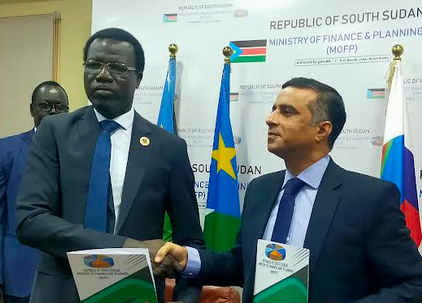South Sudan’s Ministry of Finance and Planning on Friday signed a 5 million U.S. dollars deal with the UN’s International Organization for Migration (IOM) as a government’s contribution to support the livelihood and to resettle the most vulnerable returnees from Sudan.
Speaking during the signing ceremony in Juba, Kuol Daniel Ayulo, the first undersecretary at the finance ministry said the project will support the efforts of the government in addressing the most urgent basic needs of returnees fleeing the crisis in Sudan and Internally Displaced People (IDPs) affected by floods and conflict through cash-based interventions (CBI).
“We have an emergency that requires our intervention as a government and to that, we had to look around to raise something that we can afford and support the IOM in response to the emergency,” Ayulo said.
For his part, Muhammad Asar, the head of operations at IOM South Sudan, said the project will provide cash to the returnees to buy what they need.
“For us, this is very important in a sense that people can have and make their choice with dignity rather than giving them something that they would not like,” he said.
According to Asar, the project will support the returnees with cash ranging from 100 to 120 U.S. dollars per vulnerable household every month till they resettle home.
He said the conflict in Sudan has already affected South Sudan’s economic outlook, particularly the northern states that rely heavily on imports from Sudan, leading to an increase in food and fuel prices and exacerbating protection risks, food insecurity, and negative coping mechanisms.




